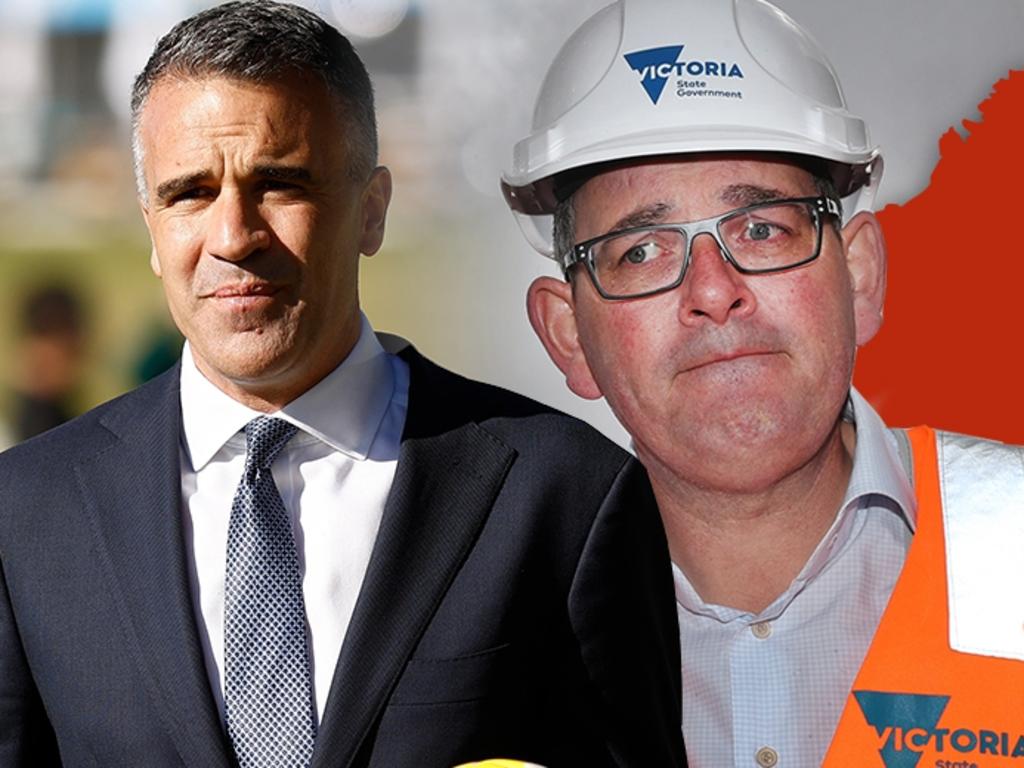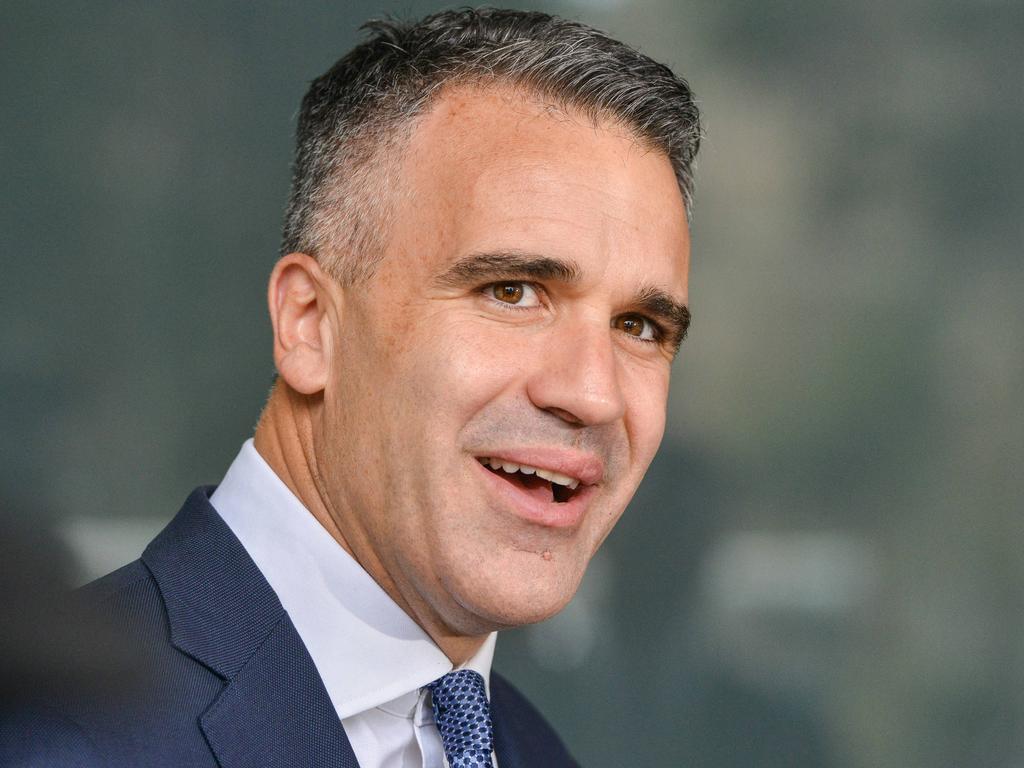Marked contrasts in Labor’s red-blue divide across South Australia, Victoria, Western Australia


That gulf was demonstrated dramatically this week with the SA government using its second budget to make political and investment capital by disparaging last month’s Victorian budget as a high-taxing assault on business.
SA Treasurer Stephen Mullighan told The Australian the SA government had been watching last month’s Victorian budget closely, with its increases to land tax and payroll, and decided there and then to devise an advertising campaign aimed at the Victorian market urging businesses to head west to low-taxing SA.
Mullighan further cemented his low-tax credentials by bringing down a budget that made good on Labor’s promise never to raise taxes or introduce new ones at any point during this term of office, despite the economic backdraft of Covid-19 blowing a hole in SA’s budget bottom line.
It was in marked contrast to the Victorian approach, where Treasurer Tim Pallas last month adopted a faux hangdog tone in telling the state it was only fair that business, the well-heeled and those private school toffs should all help pay for the economic impact of Covid, with nary a syllable of acknowledgment that this economic impact could have been reduced had his own government not set a world record for locking down its populace and shutting businesses as the virus spread.
The cultural difference between the governments is best evidenced by the politically incorrect joke doing the rounds in SA Labor circles about what the new slogan should be for the campaign to urge Victorian business to move to SA. “SA: Pro-jobs. Victoria: Pro-nouns.”
The gag speaks volumes about the ideological pedigree of the senior Labor figures in both states. While Victorian Labor is controlled by the Socialist Left and heavy with party figures who came up through the ranks of the ideologically pure Victorian bureaucracy and militant Melbourne unions, SA Labor is run by the Right, its most senior figures cutting their teeth under the tutelage of Labor powerbroker and Catholic conservative Don Farrell.
As with the Mike Rann years – Rann also being a centrist who worked cheek-by-jowl with a fiscally conservative treasurer in Kevin Foley – Malinauskas is also treading a centrist path. The former head of the state’s retail union, the SDA, where he took a collegiate approach to his dealings with big supermarkets and local SA independents such as Foodland and Drakes, Malinauskas continues to enjoy a genuinely warm relationship with the business sector. That warmth paid off at the polls last year, when Liberal Premier Steven Marshall lost the support of business through the perception he mishandled Covid by giving too much power to the health bureaucracy and police.

And on the Covid question, Malinauskas’ strategy was the polar opposite of Andrews’, motivated by Malinauskas’ conviction that the bureaucracy had become giddy on authority, and that the state’s leader needed to go in to bat for people trying to make a quid running pubs, shops and restaurants.
Malinauskas is almost hardwired towards a mistrust of government and the hard left, as the grandson of migrants who fled communism in eastern Europe. It helps explain why he has stood up to the Construction Forestry Maritime Mining and Energy Union, backed tough penalties for obstructionist protests by the climate change extremists at Extinction Rebellion, and stared down a Left faction revolt over financial support for the Saudi-backed LIV golf tournament, arguing the jobs, revenue and marketing benefits were undeniable and dismissing human rights arguments as absurd given Australia traded with the Saudis on every other level.
With Covid behind us, there are two competing Labor styles in Australia when it comes to managing the bureaucracy and economy. One holds it is the job of government to do almost everything, best evidenced by Andrews and the Queensland government with its profligate pay deals for the public service. The other holds it is the job of government to limit itself largely to key services such as health and education, but otherwise to get out of the way, not tinker with taxes, in the belief that working people will benefit from a robust private sector.
For all the flak he copped nationally over his fortress mentality, it’s one of the reasons the economically conservative Mark McGowan enjoyed such acclaim in Western Australia, convinced as he was that the only way to keep his state’s economy afloat during the pandemic was to keep the infected eastern hordes at bay.
Figures such as McGowan and Malinauskas show the Hawke-Keating traditions of an Accord-style compact with business are still alive within the ALP. When McGowan resigned last month one of the most glowing appraisals he received was from the historically pro-Liberal Association of Mining and Exploration Companies.
“Mark McGowan has achieved a great deal for Western Australia and will be remembered for a great many achievements in public life across a long political career,” AMEC chief executive Warren Pearce said.
“Our members will especially remember his extraordinary leadership during Covid-19, and his personal commitment to keeping the WA mining and mineral exploration industry open and operating safely.”
In Adelaide this week, some of the biggest praise being lavished on the Malinauskas government was coming from another historically pro-Liberal entity, the Master Builders Association, headed in SA by former Liberal Party economic adviser Will Frogley.
Frogley had a unique and telling experience before last year’s SA election where the MBA sent a policy discussion paper to the Liberal and Labor parties ahead of the March 19 poll. He never heard back from the Liberals; days later, now-Treasurer Mullighan was sitting in Frogley’s office with fluorescent Post-it notes throughout the well-thumbed MBA document, saying he and Malinauskas had worked out which policies they believed their government would be able to implement.
The announcement this week that stamp duty would be abolished for first-home buyers was in line with the calls from the MBA to boost building jobs and housing stocks.
“This a great day for South Australians who dream of building their own home, and also our local building industry,” Frogley said on Thursday after the budget came out.
Aided as he is by an irretrievably incompetent outfit in the Victorian Liberal Party, Andrews has succeeded by creating a culture of vast government dependence and playing on plebeian hostilities towards business, as if everyone who dared complain about lockdown was a Covid-denying “cooker” or only in it for themselves. The extent of the size and role of government in Victoria was hilariously underscored by the announcement in its budget last month that children could now get free fishing rods courtesy of the taxpayer, up-ending the longstanding assumption that it was the job of parents, not the state, to teach kids how to fish.
States such as WA and SA are showing that charting a smaller government through the political centre is just as effective a path towards sustained power. It’s an old-style Labor approach that sees business not as an enemy but an ally.






A red state-blue state divide is emerging across the political map of Australia, one that reflects not opposing parties but opposing ideological traditions within the ALP. While Australia may have wall-to-wall Labor governments across its mainland, their character varies considerably, with the biggest gulf existing between the well-established Daniel Andrews administration in Victoria and the newish Peter Malinauskas regime in South Australia.